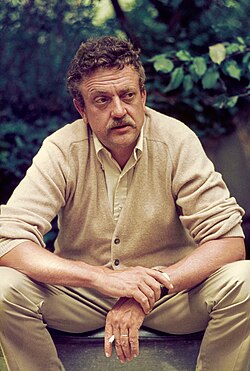Kurt Vonnegut Jr. Quote
Sentences spoken by writers, unless they have been written out first, rarely say what writers wish to say. Writers are unlucky speakers, by and large, which accounts for their being in a profession which encourages them to stay at their desk for years, if necessary, pondering what to say next and how best to say it. Interviewers propose to speed up this process by trepanning writers, so to speak, and fishing around in their brains for unused ideas which otherwise might never get out of there. Not a single idea has ever been discovered by means of this brutal method-- and still the trepanning of authors goes on every day.I now refuse all those who wish to take the top off my skull yet again. The only way to get anything out of a writer's brains is to leave him or her alone until he or she is damn well ready to write it down.
Sentences spoken by writers, unless they have been written out first, rarely say what writers wish to say. Writers are unlucky speakers, by and large, which accounts for their being in a profession which encourages them to stay at their desk for years, if necessary, pondering what to say next and how best to say it. Interviewers propose to speed up this process by trepanning writers, so to speak, and fishing around in their brains for unused ideas which otherwise might never get out of there. Not a single idea has ever been discovered by means of this brutal method-- and still the trepanning of authors goes on every day.I now refuse all those who wish to take the top off my skull yet again. The only way to get anything out of a writer's brains is to leave him or her alone until he or she is damn well ready to write it down.
Related Quotes
About Kurt Vonnegut Jr.
Born and raised in Indianapolis, Vonnegut attended Cornell University, but withdrew in January 1943 and enlisted in the U.S. Army. As part of his training, he studied mechanical engineering at the Carnegie Institute of Technology and the University of Tennessee. He was then deployed to Europe to fight in World War II and was captured by the Germans during the Battle of the Bulge. He was interned in Dresden, where he survived the Allied bombing of the city in a meat locker of the slaughterhouse where he was imprisoned. After the war, he married Jane Marie Cox. He and his wife both attended the University of Chicago while he worked as a night reporter for the City News Bureau.
Vonnegut published his first novel, Player Piano, in 1952. It received positive reviews yet sold poorly. In the nearly 20 years that followed, several well regarded novels were published, including The Sirens of Titan (1959) and Cat's Cradle (1963), both of which were nominated for the Hugo Award for best science fiction novel of the year. His short-story collection, Welcome to the Monkey House, was published in 1968.
Vonnegut's breakthrough was his commercially and critically successful sixth novel, Slaughterhouse-Five (1969). Its anti-war sentiment resonated with its readers amid the Vietnam War, and its reviews were generally positive. It rose to the top of The New York Times Best Seller list and made Vonnegut famous. Later in his career, Vonnegut published autobiographical essays and short-story collections such as Fates Worse Than Death (1991) and A Man Without a Country (2005). He has been hailed for his darkly humorous commentary on American society. His son Mark published a compilation of his work, Armageddon in Retrospect, in 2008. In 2017, Seven Stories Press published Complete Stories, a collection of Vonnegut's short fiction.
